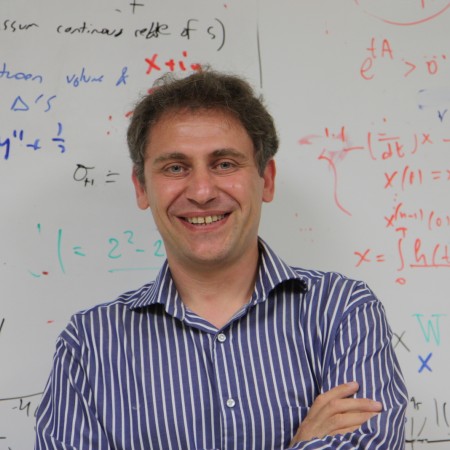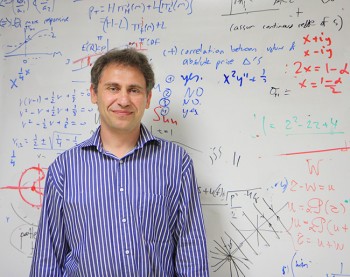D.Sc. - Applied Mathematics
Institute for Control Problems, Moscow - 2002

Professional Preparation
Ph.D. - Mathematics
Moscow Institute of Physics & Technology - 1997
Moscow Institute of Physics & Technology - 1997
M.S. - Applied Math & Physics
Moscow Institute of Physic and Technology - 1994
Moscow Institute of Physic and Technology - 1994
Research Areas
Main Research Interests
Nonlinear functional analysis, Topological degree theory, Nonlinear dynamical systems and bifurcation theory, Mathematical theory of systems with hysteresis, Applied mathematical modelingPublications
Pokrovskii, A., Rachinskii, D. Eect of positive feedback on Devils staircase
input-output relationship, Discrete and Continuous Dynamical Systems S 6, No. 4, 2013,
1095-1112. 2013 - Publication
OGrady, E., Krasnoselskii, A., Pokrovskii, A., Rachinskii, D., Periodic canard
trajectories with multiple segments following the unstable part of critical manifold, Discrete and Continuous Dynamical Systems B 18, No. 2, 2013, 467-482. 2013 - Publication
Pimenov, A., Kelly, T., Korobeinikov, A., OCallaghan, M. J. A., Pokrovskii, A.,
Rachinskii, D. Memory eects in population dynamics: spread of infectious disease as a
case study, Mathematical Modelling of Natural Phenomena 7, No. 1, 2012, 1-30. 2012 - Publication
ORegan, S. M., Flynn, D., Kelly, T. C., OCallaghan, M. J. A., Pokrovskii,
A. V., Rachinskii, D., The response of woodpigeon (Columba palumbus) to relaxation of
intraspecic competition: A hybrid modelling approach, Ecological Modelling 224, 2012,
54-64. 2012 - Publication
Krejci, P., OKane, P., Pokrovskii, A., Rachinskii, D. Properties of solutions to
a class of dierential models incorporating Preisach hysteresis operator, Physica D 241, 2012, 2010-2028. 2012 - Publication
Balanov, Z., Krawcewicz, W., Rachinskii, D., Zhezherun, A. Hopf bifurcation
in symmetric networks of coupled oscillators with hysteresis, J. Dynamics & Dierential
Equations 24, No. 4, 2012, 713-759. 2012 - Publication
Habruseva, T., Hegarty, S. P., Vladimirov, A., Pimenov, A., Rachinskii, D.,
Rebrova, N., Viktorov, E., Huyet, G., Bistable regimes in an optically injected modelocked laser, Optics Express 20, No. 23, 2012, 25572-25583. 2012 - Publication
Vladimirov, A., Rachinskii, D., Rebrova, N., Huyet, G. An optically injected mode
locked laser, Phys. Rev. E 88, 2011, 066202. 2011 - Publication
Additional Information
Awards, Honours, and Fellowships
- Heisenberg Fellowship of German Research Foundation 2004
- Russian Science Support Foundation Grant towards best researchers of Russian Academy of Sciences 2002
- Young Researcher Postdoctoral Fellowship (Russia) 2001
- Medal & Young Researcher Prize of Russian Academy of Sciences for the best research work in Informatics 2000
- Research Fellowship of Alexander von Humboldt Foundation (Germany) 1998, extension 2002
- Student and Postgraduate Fellowships of German Mathematical Society (Euler Fellowship, 1993), J. Soros International Science Foundation (1994, 1995), French National Centre for Scientific Research (CNRS, 1994), Russian Academy of Sciences (Young Researcher Fellowship, 1994, 1997).
Mentoring and Supervision
- Dr Rachinskiy supervised 4 PhD and 2 research MSc students in UCC:
- Dr Hugh McNamara (PhD 2008, University of Oxford)
- Dr MacLeod (PhD 2008, University of Limerick)
- Ms Eilish Bouse (MSc 2008, Irish Life & Permanent)
- Dr Alexander Pimenov (PhD 2009, Weierstrass Institute, Berlin)
- Mr Stephen McCarthy (thesis submitted in 2012, PhD degree award expected in spring 2013)
- Mr Edward O’Grady (thesis submitted in 2012, MSc degree award expected in spring 2013)
- He currently supervises another PhD student:
- Ms Catherine Palmer (PhD degree award expected in 2013)
News Articles
Professor Uses Language of Math to Describe Natural Phenomena
 At first glance, populations of wild animals might seem to have nothing in common with laser-based communications devices, and rivers to have little to do with macroeconomic theory.But they all can be modeled using methods of dynamical systems theory. “In my field of work, I try to mathematically describe dynamical systems and processes,” said Dr. Dmitry Rachinskiy, a professor of mathematical sciences who recently joined the UT Dallas faculty. By applying principles of mathematics to such systems, which change over time, Rachinskiy said scientists and engineers can better understand problems and phenomena in biology, physics, chemistry, technology, geosciences and economics, among other fields. “This research is applicable to many different areas, for example, population dynamics, where you have a community of several species forming an ecological system,” Rachinskiy explained. “The number of animals changes over time, and you may want to predict what those changes will be and how to control them. Dynamical systems theory gives you a means to formulate a mathematical model that will help predict how different factors affect population numbers.”
At first glance, populations of wild animals might seem to have nothing in common with laser-based communications devices, and rivers to have little to do with macroeconomic theory.But they all can be modeled using methods of dynamical systems theory. “In my field of work, I try to mathematically describe dynamical systems and processes,” said Dr. Dmitry Rachinskiy, a professor of mathematical sciences who recently joined the UT Dallas faculty. By applying principles of mathematics to such systems, which change over time, Rachinskiy said scientists and engineers can better understand problems and phenomena in biology, physics, chemistry, technology, geosciences and economics, among other fields. “This research is applicable to many different areas, for example, population dynamics, where you have a community of several species forming an ecological system,” Rachinskiy explained. “The number of animals changes over time, and you may want to predict what those changes will be and how to control them. Dynamical systems theory gives you a means to formulate a mathematical model that will help predict how different factors affect population numbers.”